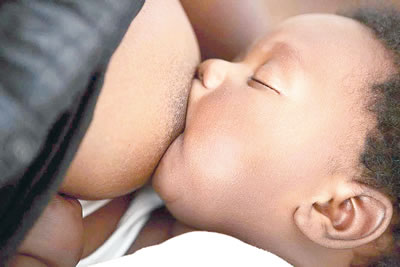Health
Breastfeeding will save 103,000 children and generate N6.6trn income annually – UNICEF
United Nations Children Fund (UNICEF) has disclosed that Nigeria has revealed that lives of 103,742 children from death annually while an additional income of N8 trillion ($21 billion) or 4.1 per cent of GDP would be generated for the economy when women breastfeed their children.
At a sensitization workshop for journalists on basic nutritional issues as part of activities to mark the Nutrition Week 2020 in Abuja on Wednesday, it was also revealed that through this, an additional 10 million case of childhood diarrhoea and pneumonia which would be prevented when women breastfeed their children exclusively for six months and continuously for the first three years of their lives..

According to findings from the Nigeria Study on Cost of not Breastfeeding by UNICEF and Alive&Thrive, Nigerian families also spend N14.4 billion ($38 million) on the purchase of baby formula every year.
Mrs Toyin Gabriel, one of the facilitators disclosed that Nigeria is the largest consumer of baby formula after China and that some of the formulas were not approved by NAFDAC because they are imported illegally and so dangerous for babies.
Mrs Chime Thompson from the Federal Ministry of Health said explained that every nutritional need of a baby is contained in breastmilk and that a woman’s body adjusts to the needs of the child according to its age.
Quoting the World Health Organisation, Thompson said that infant formula should be given to a baby only on doctor’s prescription, otherwise, it should be fed exclusively on breastmilk for the first six months and continuously for three years but that Nigeria adjusted this to first two years of life.
She said “every single day, Nigeria loses about 2,300 under-five-year-olds and 145 women of childbearing age. This makes the country the second-largest contributor to the under-five and maternal mortality in the world.”
She enumerated immediate drivers of malnutrition to include inadequate food intake, lack of dietary diversity and infectious diseases while underlying drivers are food insecurity, inadequate child and maternal care, poor access to health services and unhealthy environment.
To underscore the extent of malnutrition in Nigeria, Thompson stated that 12 million children are stunted, 2.6 million are wasted and that the highest number of stunted children in Nigeria are in Nigeria.
While one in two children are stunted in the northeast and north-west, one in five children are stunted in the southern zones.
She also disclosed that malnutrition is associated with 50 per cent of deaths among Nigerian children.
She revealed that although there is a national plan of action on implementing the nutritional intervention, poor funding has not allowed this to be effective as only 0.02 per cent of the national budget is invested on nutrition while the Global Nutrition Report 2017 recommended four per cent.
-

 News1 day ago
News1 day ago“There’s hunger, however there’s huge” hope – Tinubu Lament
-

 News1 day ago
News1 day ago“This is m@dness” – Young man disrupts the peace inside banking hall as he plays song using his JBL speaker, clip trends online (Watch)
-

 Lifestyle1 day ago
Lifestyle1 day agoNigerian man who passed away 10 years ago confesses he’s currently in Lagos, reveals big secret
-

 Biafra1 day ago
Biafra1 day agoFG confirms arrest of Simon Ekpa by Finnish authorities







